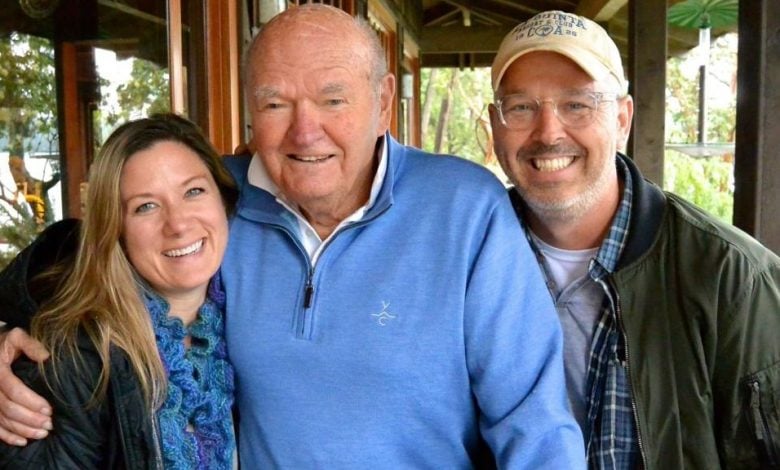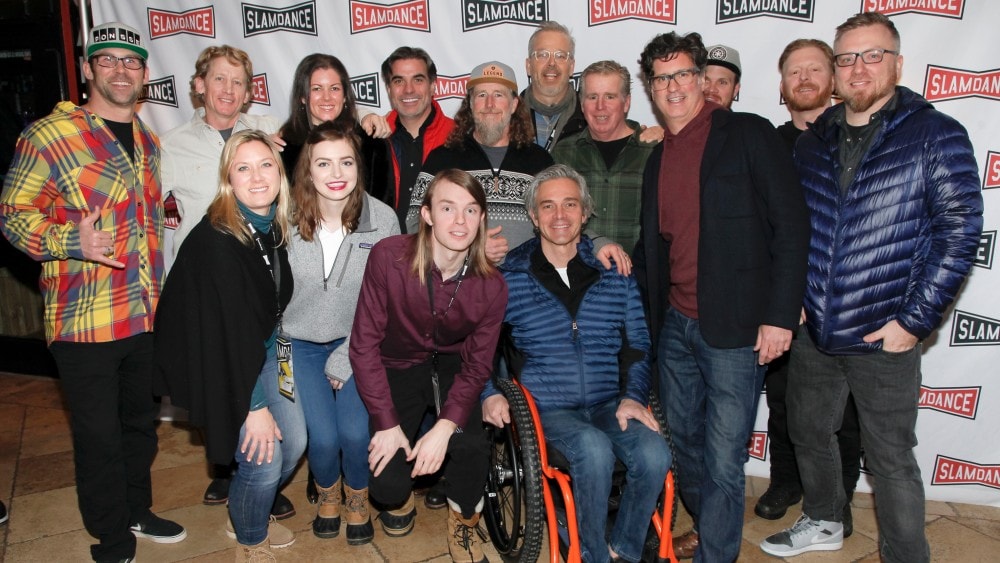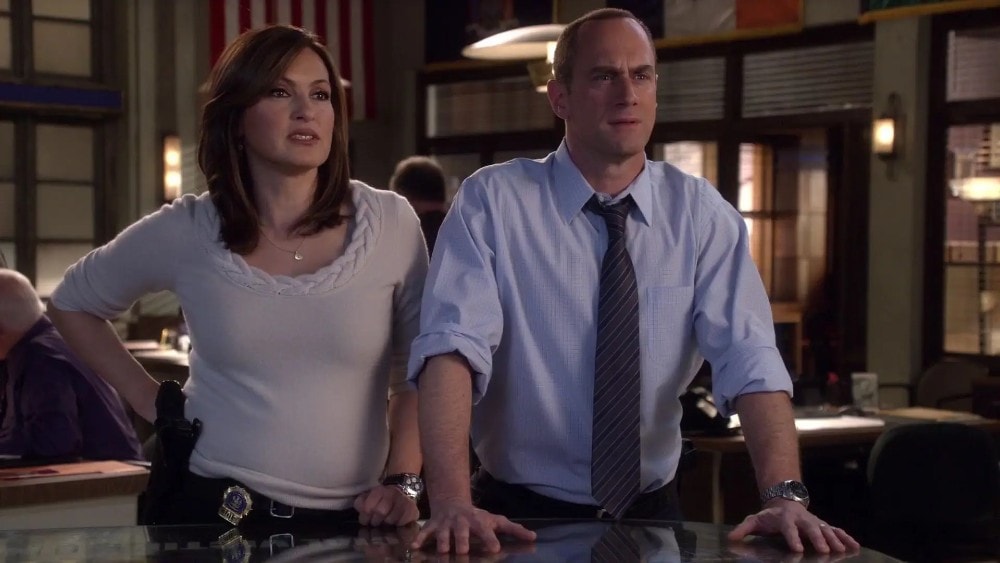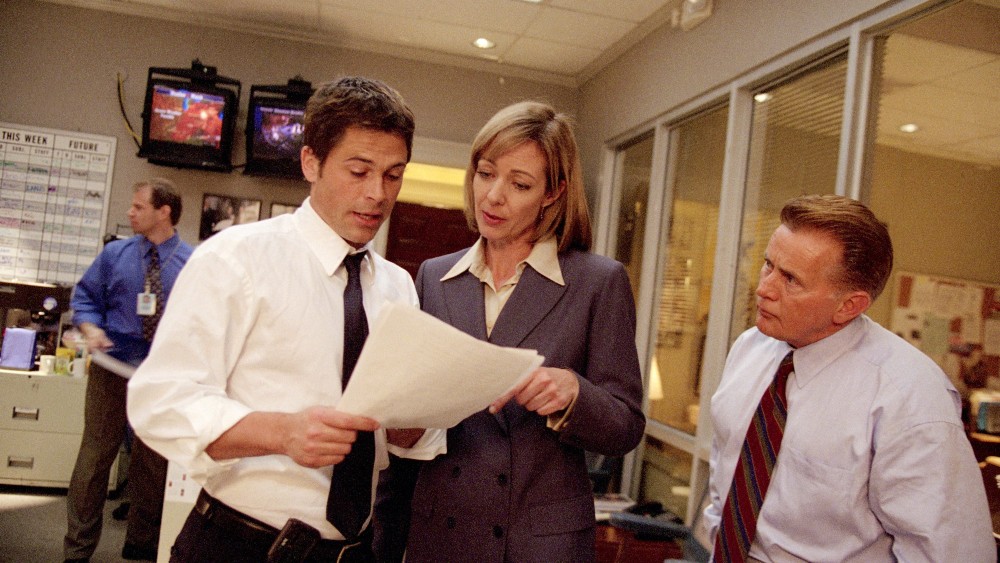
Many skiing enthusiasts will probably have heard the name Warren Miller. After all, he and his ski films are often credited as one of the main influences for popularizing skiing in the US and beyond.
But behind that legendary filmmaker persona is just a man who was chasing the perfect ski run. And that’s what Ski Bum: The Warren Miller Story explores.
The documentary chronicles not only Warren’s career from humble beginnings to sold-out theaters. But also looks at the ups and downs of his personal life. And contains what would become Warren Miller’s final interview before he passed away in 2018.
To mark the film’s release on discovery+, I spoke to Ski Bum’s director Patrick Creadon about what inspired him to do a movie on Warren, how he chooses the topics for his documentaries, him directing an episode of Law & Order: SVU, and meeting Rob Lowe among other things.
So, a big thank you goes out to Patrick for chatting with me even in the midst of finishing up his next project. Catch Ski Bum: The Warren Miller Story on discovery+. And let’s get into the interview!
Tvshowpilot: I loved Ski Bum. It really felt like an ode to Warren Miller and his life’s work. But it also wasn’t a fluff piece and didn’t shy away from talking about Warren’s struggles in his personal. How did the documentary come about? What inspired you to choose to do a documentary on Warren?
Patrick Creadon: I think my wife Christine O’Malley and I are always drawn to stories about people and characters more so than about ideas or topics. And with Warren, you not only had this terrific outdoorsmen and filmmaker, but you also had one of the great independent film distributors.
I think, he doesn’t get enough credit for that. Warren didn’t just make the movies, he went out and released them single-handedly in those early years. Year after year he did one movie a year for I think it was 39 years in a row. That’s just an interesting character, especially for someone like me and Christine who make movies for a living. So, Warren was just interesting on many different levels. I wanted to explore how he made his movies and distributed them.
Warren was also really kind of in the business of creating a fantasy. In the sense that in every Warren Miller movie that you’ve ever seen it’s a beautiful day and it’s a gorgeous mountain to go skiing on or to go adventuring on. You know, he sort of sold this idea of the great outdoors. I don’t mean that in a disparaging way.
At the same time, Warren’s personal life was complicated. He was married five times. We actually only get into three of his marriages in the movie, but he was married five times. And when someone is as committed as he was to his work often times you pay a very high personal price. And in this case, he wasn’t home very often.
His daughter Chris mentioned that he was on the road about 250 days a year. So, he had two loves in his life – his work and his family. And I think finding a balance between those two things was ultimately the challenge of his life. That was the challenge he faced every day.
And that was interesting to me and Christine. We also have three kids, just like Warren. And we sometimes face those challenges. We didn’t make quite as many movies as Warren did, so we weren’t quite as prolific as he was. And our office is mostly based at home so we see our kids every day. So, his life in front of the camera and behind the camera and ultimately away from the camera when he was with his family – that was just interesting to us. And it was a wonderful project. We just enjoyed telling his story.
Sadly, Warren passed away while we were making the film. The movie wasn’t quite completed when we got word that he had died. And so, the interview we did with him up at his house on Orcas Island in Washington was the last interview he ever gave. And I almost get a sense that Warren knew, maybe, that this would be his last interview and because of that he really laid it on the line.
He got very personal. He talked about things that he had not talked about before. Our team provided an opportunity for him to set the record straight on things in his life and the challenges he faced and the choices he made. So, that is sort of how the movie came to be and also how it is that that was Warren’s final interview.
Tvshowpilot: Were you familiar with Warren and his work prior to making the documentary? How was interviewing him for the documentary?
Patrick Creadon: I was aware of Warren Miller in two ways. As a young kid growing up in the Midwest, I had a friend whose family were big skiers and we used to go on annual ski trips with them. And before the trip, we would sit down and watch Warren Miller movies. It was like a ritual. And so I knew him in that sense.
But then in 2006 Christine and I made our first, it was a movie called Wordplay, which is about the New York Times crossword puzzle. And that movie had a really big theatrical release. It was released in about five hundred theaters in the United States in all 50 states. And so, every week I would look at the documentary box office numbers.
On that list of the top-grossing documentaries, I kept seeing the initials WM. And I didn’t know what that was. I thought maybe it was Warner Brothers, but that didn’t make sense. That would have been WB… Anyways, I finally realized that that was Warren Miller and that he and this niche that he had created were major players in the world of documentary filmmaking and documentary distribution.
So, there were two different reasons that I was aware of Warren before we started this project and it made making the movie all the more interesting for us.
Tvshowpilot: What do you hope people take away from watching Ski Bum?
Patrick Creadon: I hope that people watch Ski Bum and get their asses off the couch and do something. You don’t have to ski down the world’s most dangerous mountainsides and cliffs to have a meaningful and adventurous life.
I think Warren’s movies really inspire people. They inspired millions of people over the last five or six decades to get up and do something. You know, to get in shape, go see the great outdoors, go travel with your friends and family. And I hope that our film, Ski Bum, is not only a celebration of Warren’s work but also a reminder that, like Warren, you should do something with your life.
I think that’s kind of the legacy of Warren Miller and it’s certainly the legacy of his films and I hope that people have that takeaway when they see our film.
Where to watch Ski Bum: The Warren Miller Story:
Tvshowpilot: You’re primarily known as a documentary filmmaker. What drew you to directing documentaries instead of focusing on scripted movies or TV?
Patrick Creadon: I was probably the only eight-year-old on my block growing up in Chicago who would run home every Sunday night in time to watch 60 Minutes with my parents. My grandfather was also a fan of that show and I used to watch it with him.
I loved public television as a kid, especially an issue called Zoom. I loved that show and they always had liked documentary segments in that show about interesting kids from around the world.
So, I love movies. I love Scorsese, I love Spielberg, I love Wes Anderson, I love David Fincher, I love Steven Soderbergh, you know, it’s a long list. I love scripted films and I have a great deal of respect for that particular craft. But for me personally, I like stories about real people.
And I think Christine and I got really lucky because we started making documentaries in the golden age of documentary filmmaking. I mean, if you look at a documentary from the late 90s to the early 2000s, those movies feel very old compared to documentaries that are being made today. There’s a whole bunch of reasons for that but documentaries kind of grew out of either verité style shooting and voiceover and sit-down interviews and photographs and newspaper clippings. That’s kind of what documentaries used to look like and now they’re whatever you can dream up. There’re re-creations, there’re animations, there’s graphics. There are all sorts of interesting iterations of what nonfiction storytelling has become.
So, in some ways, as much as I love scripted television and narrative films, I just am in love with nonfiction storytelling and all the different flavors of that. I mean this genre of filmmaking, this genre of storytelling just continues to evolve. And I think it’s where a lot of the most interesting work is being done today.
Tvshowpilot: You’ve done documentaries on so many different topics from crossword puzzles and esports to priesthood and now skiing and filmmaking with Ski Bum. How do you choose the topics for your projects?
Patrick Creadon: As your question indicates, we have made movies about a lot of different topics. And, you know, that’s part of what’s fun about our job, there’s a diversity to what we do.
I hate to wake up and do the same thing every day. So, even though there’s a very wide range of topics that we’ve made movies about in some ways we kind of keep making the same movie over and over.
We try to find an interesting character or several characters. We try to figure out what is the problem in their life or the challenge in their life and we watch them figure out how to solve those problems. That’s really what our stories tend to be about. So, I think any time there’s a story that includes those elements, that’s a good jumping-off point for us.
I mean what even with our film I.O.U.S.A. which was in 2008, that was shortlisted for the Academy Awards that year, and it was a very well received and successful project. That movie was about the US National debt. But we figured at the very beginning that it can’t just be about numbers and charts. It has to be about people. And so we found two really interesting characters, kind of the odd couple of the national debt, and followed them and told their story.
And I think because of that sort of set of requirements which are pretty limitless I don’t think Christine and I will ever run out of interesting ideas to pursue.
Tvshowpilot: What is the most interesting or unexpected thing people might not know about making documentaries?
Patrick Creadon: That they’re very hard to make. The one thing a really well-made film or TV show, whether it’s narrative or documentary, have in common is that the storytellers make it look easy. The story is told in a really interesting and cool way, all the pieces fit together perfectly. It’s a really satisfying experience for the audience. But, in order to achieve that, you have to do a tremendous amount of work. You go down a lot of dead ends. You make mistakes. You have to turn around and go back.
We might do anywhere from fifty to a hundred interviews for our movies. Half those don’t even end up in the movie. So, it’s just a lot of work.
Even when I’m not there in the room when it’s playing, I’m not in the living room when people are watching it on Netflix or Amazon Prime or wherever, in a way, I am in the room. I’m in the room with Christine and our filmmaking team and our subjects and we’ve come together to tell a story.

And when the movie is done well and we really nail it, not only is that satisfying for the audience but those stories are going to last a long time. They’re certainly going to last a lot longer than we are. We’re going to be long gone and people are still going to be watching Wordplay. They’re still going to be watching If You Build It. They’re still going to be watching Ski Bum.
That’s sort of the challenge and also the opportunity of making documentaries and it has never gotten old for me. I’ve been doing this for 30 years now. I started right out of college in 1989. So, 32 years, I guess, and I love it.
And Christine has the same passion for it, so in that sense, we’re a very good fit. We love our kids most of all, we love our house, we love our pets, we love our families. But, beyond that, we really love what we do. And we really take a lot of pride in the films that we make. And that’s why we work so hard at them because we want to be good. We want them to ring true.
Tvshowpilot: In 2011 you also got a chance to direct an episode of Law & Order: Special Victims Unit (season 12 episode 19). How was that experience?
Patrick Creadon: Neal Baer, who was the executive producer of that show for quite a while, happened to have been a really big fan of Wordplay, our New York Times crossword puzzle movie. He reached out, asked if I wanted to come work on his show and I said I’d love to.
So, I spent about 10 weeks on set in New York City. We live in LA so I spent quite a bit of time in New York just shadowing the other directors and watching how they shoot and cut that show. Getting to know the cast members, getting to know the crew, so that by the time my episode came along and I was ready to jump in the director’s chair. You know, they knew me and I knew them and it was a wonderful experience.

I was a little intimidated. I mean at the time Mariska Hargitay and Chris Meloni, the two stars of that show, were the highest-paid actors on television. And because I’m a documentary guy, I had never directed actors in anything in my life. Not even a student film.
I went to the American Film Institute and studied cinematography. So, really I didn’t have any directing experience. And I asked them if they are sure they want me to come on board because this is not really my niche, I love the show, but I’m not sure I’m the right guy. And Neal said: “You’re a great storyteller, so that’s what I need. I don’t need a director with years of experience, I need a good storyteller. That’s what we want on our show.” And so, I had a wonderful time.
In fact, once word got out that I was a documentary filmmaker several of the cast members and several of the crew members had questions for me. They wanted advice. They were working on their own projects, Ice-T in particular. He and I talked a lot about projects that he was developing and documentaries that he wanted to make and he would pick my brain and I would pick his.
Our films are seen widely. Documentaries in general, are just really, really popular. And there’re some incredible storytellers who make documentaries. So, it’s a kind of a great time to be doing this.
Tvshowpilot: Here on the blog, we’re all about TV shows, so, what is your current TV obsession or a TV series you think everybody should be watching right now?
Patrick Creadon: The last show Christine and I really got into was The Crown and I wasn’t quite sure what I would make of it or whether I even enjoy it. I loved it. We became obsessed with that show. Our kids haven’t seen it yet. They’re teenagers. So we’re trying to get them to watch it, too. But we got through all four seasons already. I may go back and watch it again if I have any takers amongst our kids, our three daughters.
It’s just incredible storytelling and incredible filmmaking. Every single episode is like an incredible feature-length film. One after the other, after the other. I think there were 40 episodes. So it’s a gigantic effort, a monumental achievement, and I really, really loved it.
One of the reasons I was drawn to it so much in part is that it’s based on real people. Of course, it’s not a documentary and I’m sure there were some creative licenses at work there amongst the writers and directors, and actors. But it’s incredibly good filmmaking and it’s based on characters that we’re pretty familiar with and that’s kind of right in my sweet spot. So, I really loved it.
I will say though, that when the pandemic hit and things were crazy here in the United States on the political landscape, Christine and I went back and watched every single episode of The West Wing.
Obviously, that’s not a true story, but it’s based on true things. There’s so much history and there so much real-world events that are either in the series or they kind of slightly rewrite it so you’re not using real names in certain cases. But I think The West Wing is the greatest scripted television show that was ever made.
Part of the reason I feel that way is that it offers us an idealized version of what we hope is going on inside the White House. And I think there’s real value to that. People want to have faith in their government and they want to have faith in their leaders. And if there’s a bad player in the room, we want that person to be sniffed out. We want the good guys to win. And I think that’s why I love that show so much, especially now.
Interesting side note to that, when I was working on Law & Order, I met Rob Lowe. He was a friend of Neal Baer and we were having lunch one day and Rob came over. I mean Rob Lowe is Rob Lowe. It was kind of fun to meet him.
This was a few years ago. President Obama was still in the White House. And I asked him if he gets back to the White House very often, and he said that yeah, he went back in 2009, shortly after the Obama administration moved in.
You know, he has been to the White House many, many times when they were working on The West Wing. So, he called them up and said he’s going to be in town and that he’d love to come by just to see the building. And they were like, of course, come on over, we’d love to see you.

So, Rob Lowe shows up at 9 am on a Saturday expecting it to be kind of empty. He was there more to see the building and the people who work there, the full-time staffers at the White House, not the Obama administration. It was a weekend so we figured he wouldn’t meet anyone. But he walked in and there waiting for him was Jon Favreau. Not the filmmaker, but Jon Favreau, the speechwriter, who’s President Obama’s speechwriter, and his entire team of speechwriters.
There were about eight or ten people there from Jon’s department. And Rob wasn’t expecting them to be there, but he was certainly happy to meet them. You know, Jon Favreau is the person responsible for writing so many of Obama’s great speeches, both on the campaign trail and also once he became president. And they all showed up that early on a Saturday morning because they wanted to thank Rob.
They wanted to thank him for his role and character in The West Wing because so many of them had been inspired by that show and by Rob’s character as a speechwriter in The West Wing to work in politics and someday to maybe work in the White House.
Everyone that was there that morning to meet Rob had had that dream. And as I mentioned most of them got that dream from Rob and from that show. So I think for people who love television and love movies and for people who make television, there’s just a really close relationship that exists between the stories that we tell and the people who are enjoying those stories and being inspired by them.
Tvshowpilot: Finally, what’s next for you? Any new projects you’re currently working on that you can share?
Patrick Creadon: We’re making a film called The Loyola Project. It’s about a college basketball team from 1963. It’s a really fascinating story that we’re in the middle of telling. It will probably come out at the end of 2021 or 2022 and I can’t wait for that movie to come out because it’s going to be really good.
I hope you’re still with me and that you enjoyed this interview with Ski Bum: The Warren Miller Story director Patrick Creadon where he shared everything from some amazing insights on what makes a good story to a story about Rob Lowe meeting Obama’s speechwriter Jon Favreau at the White House.
Don’t forget to check out Ski Bum on discovery+ and all the other places you can get the film. Thanks for reading and as Warren Miller would say: “I’ll see you same time, same place next year”.